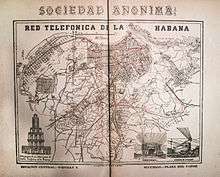Telecommunications in Cuba
Telecommunications in Cuba consists mainly of NTSC analog television, analog radio, telephony, AMPS, D-AMPS, and GSM mobile telephony, and the Internet. Telephone service is provided through ETECSA (Telecommunications Company of Cuba), mobile telephone service is provided through the Cellular Telephone Company of Cuba (CUBACEL) and Caribbean Cellular (Celulares del Caribe, C-COM). Cuba's main international telecommunications links are through Intersputnik, with antiquated undersea telephone cables to the U.S., the West Indies, Spain, and possibly Italy.
Telephone

Country code: +53
International call prefix: 119
Telephones - main lines in use: 1.2 million, 72nd in the world, less than 10 per 100 inhabitants (2009).
Telephones - mobile cellular: One million mobile phones at the end of 2010 (9 per 100 inhabitants), up from 621,000 in 2009 and 330,000 in 2008, when all Cubans were allowed to buy and use them for the first time. Mobile-cellular telephone service is expensive and must be paid in convertible pesos, which limits subscribership.[1][2]
Telephone system: 95% of telephone switches were digitized by end of 2006.[2] Principal trunk system is coaxial cable; fiber-optic distribution in Havana and on Isla de la Juventud; two microwave radio relay installations (one is old, US-built; the other newer, Soviet-built); both analog and digital mobile cellular service established; one international satellite earth station, Intersputnik (Atlantic Ocean region).
New fiber-optic link: A new undersea fiber-optic link with Venezuela was scheduled for 2011.[3][4] In May 2012 there were reports that the cable was operational, but with use restricted to Cuban and Venezuelan government entities. Internet access by the general public still used the slower and more expensive satellite links,[5] until January 2013 when internet speeds increased.[6]
Radio
Radio broadcast stations: 6 national radio networks, an international station, and many local radio stations. All state-owned and operated by the Cuban Radio and Television Corporation (ICRT), which manages Radio Rebelde, the largest AM network, and the SW service Radio Habana Cuba. Radio Marti, based in Miami, Florida and financed by the United States government, transmits Spanish-language radio broadcasts to Cuba.[2]
Radios: 3.9 million, 64th out of 188 in the world (1997)[7]
Television
Television broadcast stations: 4 national TV networks and many local TV stations. All state-owned and operated by the Cuban Radio and Television Corporation (ICRT). TV Marti, based in Miami, Florida and financed by the United States government, transmits Spanish language TV broadcasts to Cuba. The American Forces Network (AFN) has a station intended for U.S. military personnel at Guantanamo Bay Naval Base.[2]
Televisions: 2.64 million, 54th out of 185 in the world (1997)[8]
Internet

Internet users: 2.8 million users, 79th in the world, roughly of 26 percent of the population in 2012.[10] 1.6 million, 79th, 12% in 2010.[2]
Internet service providers (ISPs): 2, Empresa Telefónica de Cuba, S.A (ETECSA) and Colombus (2003)
Top-level domain: .cu
A special permit is required to use the Internet. Access to the Internet is heavily controlled, and all e-mails are closely monitored.[11][12]
The Cuban authorities have called the Internet "the great disease of 21st century" due to 'counter-revolutionary' information being available on a number of websites, some of which are official news sites.[13] As a result of computer ownership bans, computer ownership rates were among the world's lowest.[12] However, since buying a computer was legalized in 2007, the ownership of computers in Cuba soared, dramatically increasing the number of Internet users. But, the rates still remain quite low, partially due to the high costs of systems and Internet usage per hour in contrast to the average monthly wage.[11]
See also
References
- ↑ Marc Frank; Kevin Gray & Eric Walsh (7 July 2011). "Cuban cellphones hit 1 million, Net access lags". Reuters. Retrieved 6 November 2011.
- 1 2 3 4 5 "Country report: Cuba", World Factbook, U.S. Central Intelligence Agency, 27 September 2011
- ↑ Undersea cable to bring fast internet to Cuba, The Telegraph (UK), 24 January 2011
- ↑ Andrea Rodriguez (9 February 2011), Fiber-Optic Communications Cable Arrives In Cuba, Huffington Post
- ↑ "Fiber-optic cable benefiting only Cuban government", Miami Herald, 25 May 2012
- ↑ Marc Frank (22 January 2013). "Cuba's mystery fiber-optic Internet cable stirs to life". Havana. Reuters. Retrieved 26 January 2013.
- ↑ "Radio receivers by country", NationMaster.com, accessed 6 October 2011
- ↑ "Television receivers by country", NationMaster.com, accessed 6 October 2011
- ↑ TECNOLOGÍA DE LA INFORMACIÓN Y LAS COMUNICACIONES EN CIFRAS. CUBA 2011 de la Oficina Nacional de Estadística e Información, Enero-Diciembre de 2011
- ↑ "Percentage of Individuals using the Internet 2000-2012", International Telecommunications Union (Geneva), June 2013, retrieved 22 June 2013
- 1 2 "Internet Enemies: Cuba". Reporters Without Borders. March 2011.
- 1 2 Claire Voeux & Julien Pain (2006). "Going online in Cuba: Internet under surveillance" (PDF). Reporters Without Borders.
- ↑ "Internet in Cuba", Reporters Without Borders, 2003
External links
- Empresa de Telecomunicaciones de Cuba S.A. (ETECSA, Telecommunications Company of Cuba) web site (in Spanish). English translation.
- "¿Cómo andan los Servicios de Telecomunicaciones en Cuba?" ("How are telecommunication services in Cuba?") - A description and critique of the state of Empresa de Telecomunicaciones de Cuba S.A. (ETECSA, Telecommunications Company of Cuba) as of 21 June 2013. (in Spanish). English translation.
- Cuba - Mobile Coverage and Network Information, Mobile World Live